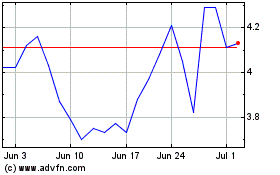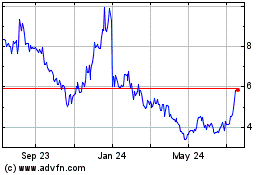Anavex Life Sciences Announces Publication of Clinical Data for ANAVEX®2-73 (blarcamesine) in Alzheimer’s Disease
April 23 2020 - 7:00AM

Anavex Life Sciences Corp. (“Anavex” or the “Company”) (Nasdaq:
AVXL), a clinical-stage biopharmaceutical company developing
differentiated therapeutics for the treatment of neurodegenerative
and neurodevelopmental disorders including Alzheimer’s disease,
Parkinson’s disease, Rett syndrome and other central nervous system
(CNS) diseases, today announced the publication in the
peer-reviewed journal, Alzheimer's & Dementia: Translational
Research & Clinical Interventions, entitled, “A precision
medicine framework using Artificial Intelligence for the
identification and confirmation of genomic biomarkers of response
to an Alzheimer’s disease therapy: Analysis of the Blarcamesine
(ANAVEX2-73) Phase 2a clinical study.“
“This study highlights the relevance of
phenotypic and genotypic precision medicine analyses of Whole Exome
Sequencing (WES) and gene expression (RNAseq) data in drug
development and in particular the potential to identify patients’
genetic variants and gene expression changes that may predict
increased chances of success of Alzheimer’s disease treatments,”
said Dr. Harald Hampel, M.D., Ph.D., M.A., M.Sc., Founding
President of the Alzheimer Precision Medicine Initiative (APMI)1
and lead author of the paper.
Alzheimer’s disease is a progressive,
multi-factorial disease and the most common cause of primary
neurodegenerative dementias. AD incidence in U.S. is approximately
5,700,000. It is estimated that 50 million people live with
dementia worldwide. The current annual cost of dementia is
estimated at $1 trillion, a figure set to double by 20302 and the
expected burden on the healthcare systems is dramatic. Today, there
are no commercially available therapies to address the underlying
biological cause of Alzheimer’s progressive cognitive decline.
“We believe that the analysis platform described
in this work opens the possibility of using big data-driven
unbiased genome-wide patient selection marker identification early
on in the drug development process of CNS diseases, including
Alzheimer’s disease, which is currently applied more routinely in
the field of oncology,” said Christopher U. Missling, PhD,
President and Chief Executive Officer of Anavex. “Findings from
this study were the basis for the testing of potential patient
selection markers in our ongoing Phase 2b/3 Alzheimer’s disease
(AD) study (NCT03790709), as well as the Parkinson’s disease
dementia (PDD) (NCT03774459) and Rett syndrome (RTT) studies
(NCT03758924, NCT03941444 and NCT04304482) with ANAVEX®2-73
(blarcamesine).”
The full paper can be accessed online at:
(https://alz-journals.onlinelibrary.wiley.com/doi/full/10.1002/trc2.12013).
About Anavex Life Sciences Corp.
Anavex Life Sciences Corp. (Nasdaq: AVXL) is a
publicly traded biopharmaceutical company dedicated to the
development of differentiated therapeutics for the treatment of
neurodegenerative and neurodevelopmental disorders including
Alzheimer’s disease, Parkinson’s disease, Rett syndrome and other
central nervous system (CNS) diseases, pain and various types of
cancer. Anavex’s lead drug candidate, ANAVEX®2-73 (blarcamesine),
recently completed a successful Phase 2a clinical trial for
Alzheimer’s disease. ANAVEX®2-73 (blarcamesine) is an orally
available drug candidate that restores cellular homeostasis by
targeting sigma-1 and muscarinic receptors. Preclinical studies
demonstrated its potential to halt and/or reverse the course of
Alzheimer’s disease. ANAVEX®2-73 (blarcamesine) also exhibited
anticonvulsant, anti-amnesic, neuroprotective and anti-depressant
properties in animal models, indicating its potential to treat
additional CNS disorders, including epilepsy. The Michael J. Fox
Foundation for Parkinson’s Research previously awarded Anavex a
research grant, which fully funded a preclinical study to develop
ANAVEX®2-73 (blarcamesine) for the treatment of Parkinson’s
disease. ANAVEX®3-71, which targets sigma-1 and muscarinic
receptors, is a promising preclinical drug candidate demonstrating
disease-modifying activity against the major hallmarks of
Alzheimer’s disease in transgenic (3xTg-AD) mice, including
cognitive deficits, amyloid and tau pathologies. In preclinical
trials, ANAVEX®3-71 has shown beneficial effects on mitochondrial
dysfunction and neuroinflammation. Further information is available
at www.anavex.com. You can also connect with the company
on Twitter, Facebook and LinkedIn.
Forward-Looking Statements
Statements in this press release that are not
strictly historical in nature are forward-looking statements. These
statements are only predictions based on current information and
expectations and involve a number of risks and uncertainties.
Actual events or results may differ materially from those projected
in any of such statements due to various factors, including the
risks set forth in the Company’s most recent Annual Report on Form
10-K filed with the SEC. Readers are cautioned not to place undue
reliance on these forward-looking statements, which speak only as
of the date hereof. All forward-looking statements are qualified in
their entirety by this cautionary statement and Anavex Life
Sciences Corp. undertakes no obligation to revise or update this
press release to reflect events or circumstances after the date
hereof.
For Further Information:
Anavex Life Sciences Corp.Research &
Business DevelopmentToll-free:
1-844-689-3939Email: info@anavex.com
Investors & Media:
Email:
ir@anavex.com
1 www.apmiscience.com2
https://www.alz.org/alzheimers-dementia/what-is-alzheimers
Anavex Life Sciences (NASDAQ:AVXL)
Historical Stock Chart
From Mar 2024 to Apr 2024

Anavex Life Sciences (NASDAQ:AVXL)
Historical Stock Chart
From Apr 2023 to Apr 2024
